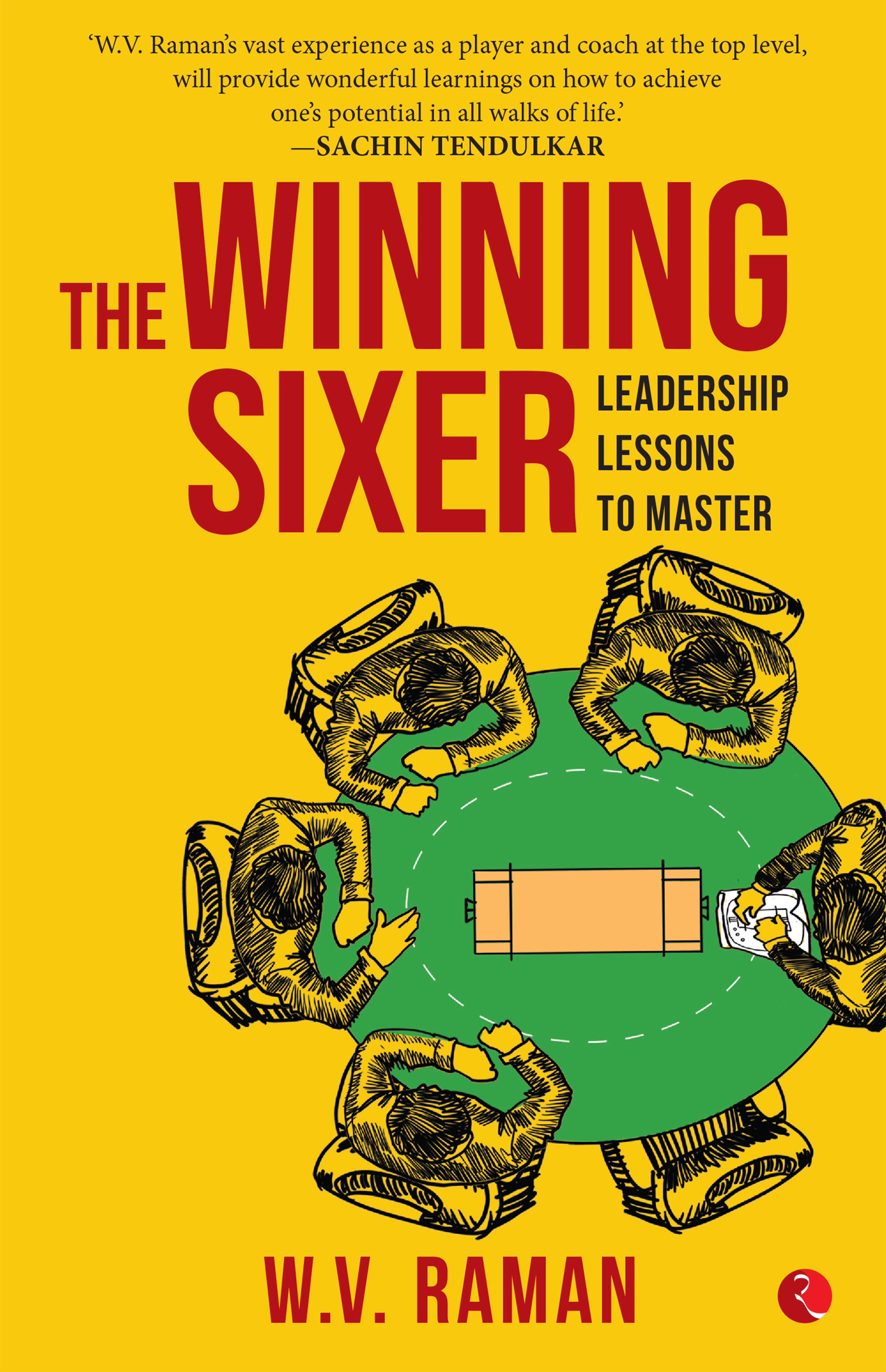The Five Cs of Leadership – An Excerpt from WV Raman’s ‘The Winning Sixer’

Ramesh stood up to fill a couple of glasses with water, as the weather in Bengaluru was humid, resulting in dehydration. As he sat down, he asked, ‘What are the other types of leaders you have encountered?’
Giving pause for thought, I replied, ‘I would say there are those with innate leadership qualities, some who acquire great leadership skills through experience and then there are others who learn through watching, listening and quizzing. Don’t try to read between the lines, as I am not taking a jibe at you, amigo.’
‘What qualities in a leader have impressed you so far?’ Ramesh was surely getting into the groove, and there is no stopping him when he reaches that point. Enjoying a sip of ice-cold water, I said, ‘Based on my experience, I believe that a fabulous leader has the five Cs.’
‘Five Cs?’ Ramesh questioned. ‘That is certainly different from what you generally hear.’ I wound him up by saying, ‘I am different in many ways, you should know by now. I am left-handed when the majority is right-handed.’ As his confusion grew, I put him out of his misery saying, ‘The five Cs are credibility, clarity, connect, control and conviction.’ As Ramesh involuntarily raised his eyebrows, I elaborated, ‘No matter how good you are, you will be a complete failure if you lack credibility. The team will not trust you. Additionally, you must also have clarity of thought and communication to enable the team to work as one whole unit, the ability to connect on the right wavelength to empower your team, the ability to control your own shortcomings and finally, have conviction in your decision-making.’
Excitedly, he slipped to the edge of the seat and mumbled, ‘I see.’ I continued, ‘Talking of credibility, it’s imperative that a leader doesn’t have one set of rules for himself and a different set for the rest of his team. A leader cannot demand of his team what he himself does not do.
Leaders who have taken that route have been miserable failures. A good leader is one who carries his team members along by being a good team player himself. ‘Most importantly, a leader has to avoid the pitfalls of becoming an establishment man in a bid to retain his position. Generally, in sports, team members raise the bar for a captain who gains their trust, and thereby their respect…’
‘Care to give an example of a leader who was an establishment man?’ Ramesh intervened. ‘I don’t want to go there, but all I can say is that I have often read that people never quit their jobs, they quit their bosses. This option is available to people in the corporate sector, but not to a sportsperson, who cannot quit the sport just because he is unhappy with the boss—in his case, the captain.’
‘What does a sportsperson do then?’
‘He continues to do his best for the team. In sports, questionable traits will get exposed sooner than later because unknown to him, the leader is being watched and monitored from all quarters. His decisions get assessed and analysed—not only within the dressing room and in the fraternity but by the public too,’ I replied calmly.
‘Yes, that is why a captain’s job is tough. Now, what about the clarity bit?’ Ramesh said earnestly.
‘You were and are a big fan of Tiger Pataudi, aren’t you?’ Just to break the monotony, I countered his question with a question.
‘You should know the answer to that question, after all these years,’ Ramesh retorted.
‘Yes, I do. But I wanted to see if you were able to see the relevance and the reason for my digression,’ I challenged.
‘I did wonder about it and no, I cannot see the relevance.’
‘Surely you must have seen Pataudi’s interview that was re-run on television when he passed away,’ I said in a sombre tone.
Ramesh nodded his head, but his eyes wore a distant look as he tried to make sense of what I was implying. ‘I only lost my sight, not my vision. Remember that line? It was Pataudi’s response when asked about life after he lost his eye in an accident. To me, those words are iconic. That is clarity explained in one short sentence, my friend. Imagine the turmoil of losing an eye in his early twenties, the struggle to execute even day-to-day activities and the lingering uncertainty of whether he can ever pursue his passion. But none of these obstacles deterred Pataudi from playing cricket, and that too at the top level.’
I believe these eight words of Pataudi epitomize clarity. I, therefore, urged Ramesh to figure out why I was so fascinated by that statement. He was clearly puzzled and asked unassumingly, ‘Not losing his vision in life?’
‘To a large extent, yes,’ I replied, ‘but such clarity cannot exist in anyone unless he is ruthlessly dispassionate under adversity. That is the key takeaway from that statement. Most people, in a similar situation, would have submerged in self-pity and endeavoured to elicit sympathy from others.
But Pataudi took it on the chin and carried on pursuing his passion. That is inherent greatness, my friend.’ We toyed absently with the pieces of kebab on our plate that we had ordered a while ago as we reflected on our conversation. Lighting up a cigarette, Ramesh said, ‘Never thought so deeply about that statement to attach as much significance to it as you have. Nevertheless, your interpretation has surely made me realize its depth and impact. Now, what is this connect all about?’
‘The ability to listen to others and connect with them on the right wavelength or, in fact, on the preferred wavelength of each team member is critical. Otherwise, you will be at sixes and sevens. In a team, each person is different. If you fail to understand the mindset of the individual, or what makes each one tick, you will be in a soup.
‘There is a classic story—even if it is apocryphal—about how Mike Brearley, the former England captain, eased the pressure on Chris Tavaré, his opening partner. The version of the story I heard went something like this. As Brearley and Tavaré walked out to open the innings in a Test match, the former, of all things under the sun, apparently asked Tavaré about a small doubt he had in biology. Tavaré provided as much clarification as he could until they reached the middle and it was time for Tavaré to take strike. They never pursued that thread of conversation later. But going deeper into the incident, it seems Brearley deliberately brought it up knowing that Tavaré was a biology teacher. It was Brearley’s way of calming Tavaré’s nerves. He engaged Tavaré in a subject/conversation that he was comfortable with. That is a masterclass on connect, if ever there was one, my friend.’ Ramesh thought about it for a moment and said, ‘Interesting. It’s quite possible for Brearley to have pulled off something like that.’

‘Even if it is a made-up story, the essence of it cannot be disregarded, I think.’
‘Fair enough, we do learn some important lessons even from fables at times, don’t we?’
Seeing me give him a stern look, he asked quickly, ‘What about control? What kind of control are you referring to?’ I suppressed my smile at his hasty retreat. ‘Control is not about having the ultimate authority. It is about fine-tuning or calibrating your emotions and prioritizing your various functions and responsibilities. As a leader, you will have to play different roles and execute diverse duties. Therefore, unless you develop the ability to control both your temperament and your heart, you will not gain respect from your team and the road ahead will be bumpy. To illustrate this, I can think of none other than our very own MS Dhoni. He has mastered the ability of not wearing his heart on his sleeve. Yet, he is in control without making it obvious as to who is in charge.’ The tape ran out and Ramesh had to switch sides, which gave us both an opportunity to take a break and enjoy the silence of the night. Mosquitoes buzzed about in the balcony, but fortunately, we were adequately protected. We remained silent as Ramesh took a puff, enjoying the gentle evening breeze. Once he stubbed his cigarette out, Ramesh asked, ‘Do you think Dhoni would have been quiet in the dressing room even when things went horribly wrong?’
‘I wouldn’t want to engage in conjecture, but I presume he would have ticked people off privately, if only to allow those being ticked off to save face. But as he has repeatedly remarked, the dressing room is the place for letting off steam, if at all. Here again, that is his way of doing things.’
‘What about you as captain?’ Ramesh asked, helping himself to a glass of water.
‘I used to let go if it was warranted. But with the passage of time, others realized I had a valid reason for flying off the handle. On my part, I learned to exercise better control.’
‘At least you were being you, as you are even now, in accepting that you took time to calibrate your human limitations,’ Ramesh said without any malice. ‘Perhaps that’s the reason why my team members never took my outbursts personally. At times, when I snapped for no reason, I have even apologized to the recipient of an unwarranted whiplash,’ I remarked in an even tone.
***
Read more on Kindle.
***

